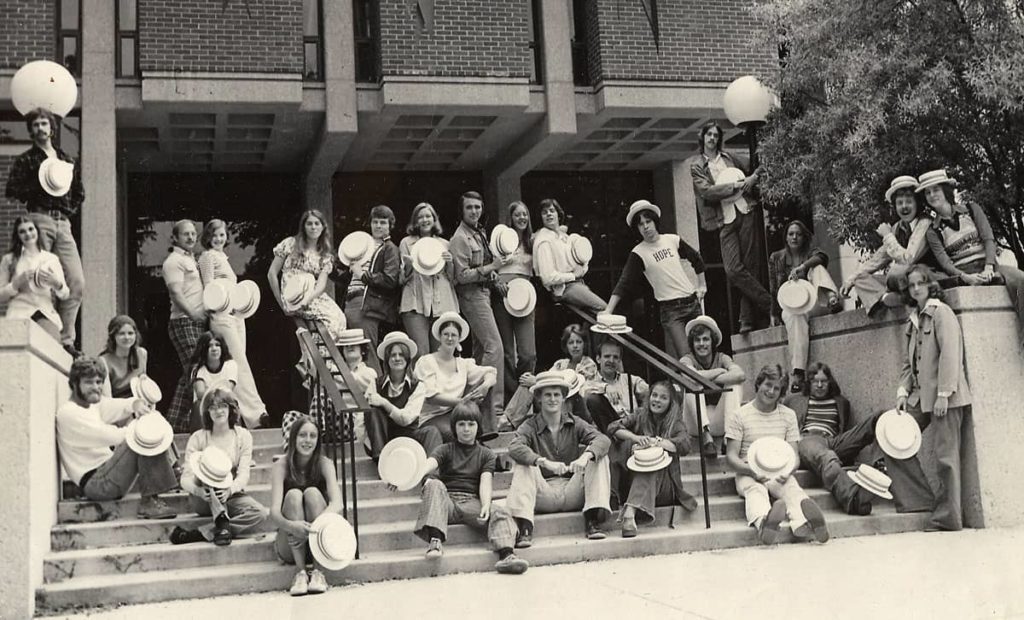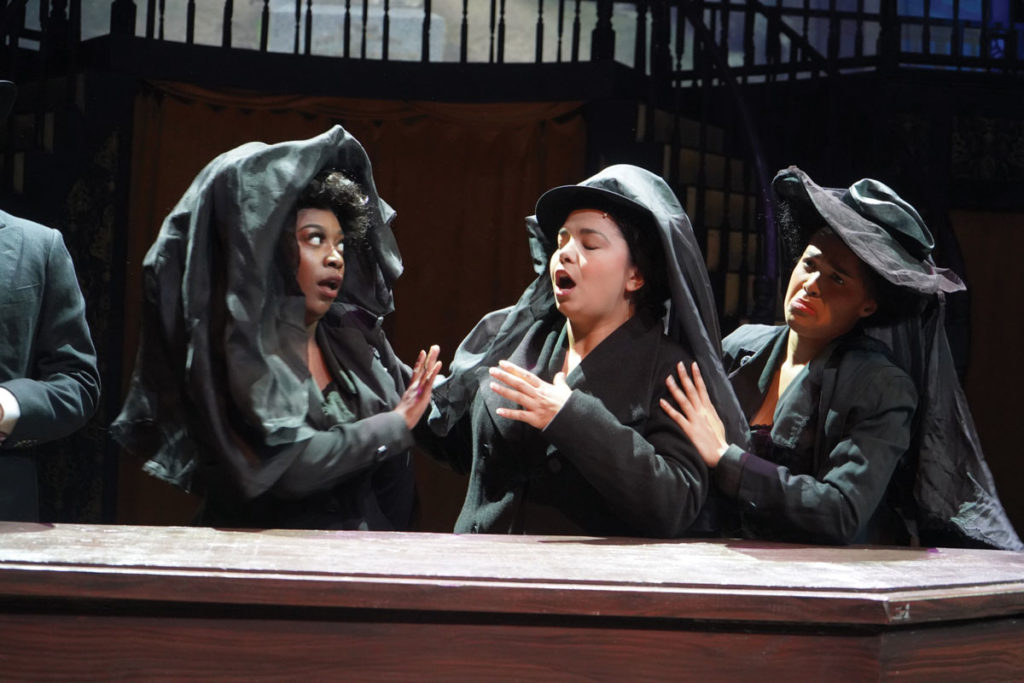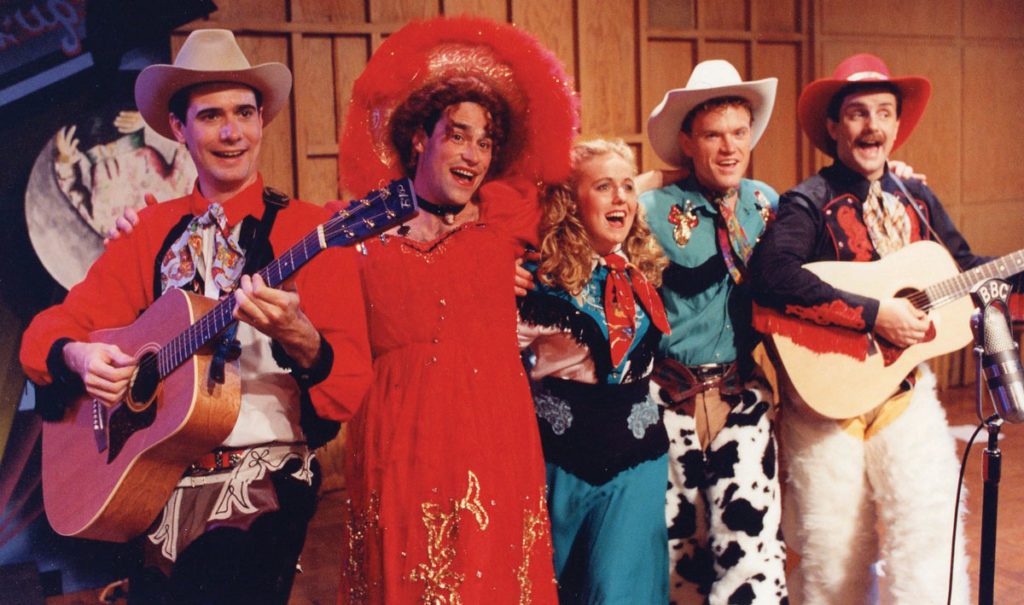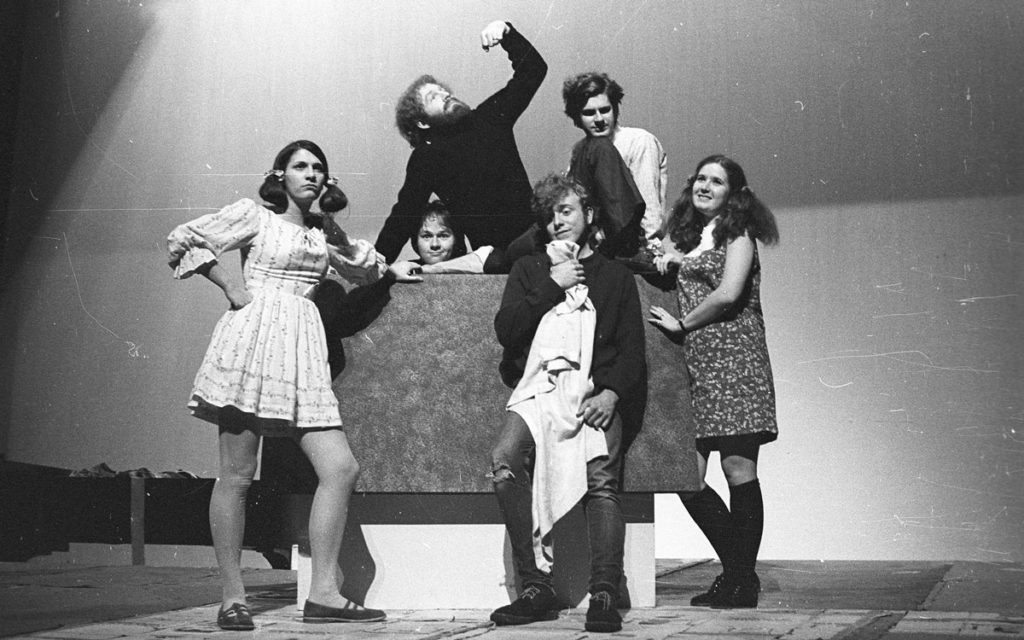HSRT is Golden
50 Seasons on the Hope Stage
After all these years, its origin story has taken on a bit of a mythical quality, and it goes like this:
It’s 1971, and a long-awaited theatre on the campus of Hope College has finally been completed. While its new paint smell slowly dissipates, two young and ambitious theatre professors, John Tammi and Don Finn, connive and brainstorm and decide that their new theatrical home — DeWitt theatre — should not only host plays during the school year, but house a summer company, too. Talented Hope theatre students could cut their acting and artistic chops during the summer, they reasoned, and professional actors could be brought in, too. They would call it Hope Summer Theatre; they would put on four shows that would run back-to-back in three-week periods; and, they would take advantage of one of the best selling points in the new space: Air conditioning.
“I remember talking with Don about all of the positive reasons why starting a summer theatre in Holland, at Hope, made perfect sense artistically,” says Tammi, professor emeritus of theatre who, after 47 years at the college, retired in 2014. “I also remember Don saying to me, ‘It makes sense because we’d be the only air-conditioned theater facility in western Michigan.’ So, for a few years our promotional poster had a line that read, ‘In air-conditioned comfort.’”
Just two seasons in, Finn and Tammi would change the company’s direction and name. People were staying away in droves, Tammi remembers, and something had to give. A course correction was required. The company became Hope Summer Repertory Theatre in 1974, with various plays rotating throughout a 12-week period, “which was what we wanted to do from the beginning,” founding artistic director Tammi confides.
It wasn’t long before a children’s performance troupe started (1973); more air-conditioned stages joined the DeWitt mainstage to host the burgeoning seasonal repertoire (the DeWitt studio theatre, Snow Auditorium in the former Nykerk Hall of Music, the Knickerbocker Theatre, the Jack H. Miller Center for Musical Arts); and the company grew in reputation and the audiences in number. This summer, despite some periods of financial uncertainty and the recent challenges of COVID-19, HSRT celebrated its golden anniversary — 50 years of educating and employing hundreds of up-and-coming and professional actors; 50 years of educating and entertaining thousands of Holland-area theatre-goers with more than 300 shows that reflected the width and breadth of the human experience.
“I’m just happy to have lived long enough to see it,” Tammi muses.
“From the very beginning, we had pretty high standards for theatrical art and that was really due to John Tammi,” says Mary Schakel ’69, who began her 40-year association with HSRT in its first year as a costume designer and ended as its producing director in 2012. “Everybody fed off of that as the years progressed. It’s pretty amazing that a theater [company] lasts 50 years, especially because of COVID.”
If not for COVID, last year would have marked the 50th season of HSRT, but the global pandemic kept the DeWitt and other campus theaters dark in 2020. The shows went on in 2021, albeit in limited runs and on an outdoor stage on the Van Raalte Commons so actors and audience could remain as safe and healthy as possible while unmasked. This year, all shows returned inside with actors unmasked during performances, while the audiences were required to wear a protective face covering “due to strict actors’ union rules,” says Lenny Banovez, HSRT’s current artistic director. “Basically, the audience wore masks so that the actors didn’t have to. . . And people were pretty understanding of that.”
Banovez came to HSRT in 2018 and is cut out of similar cloth as Tammi. Banovez also co-founded a theatre group, TITAN Theatre Company in New York City, which he still continues to artistically direct from September to May. In Holland for the past five summers, he says he feels the force of “standing on the shoulders of giants” like Tammi and Schakel and David Colacci (former artistic director for 23 years) and hundreds of other company members of renown, especially in this 50th season.
For long-time HSRT cast member Chip Duford ’90, being a part of a reputable regional theatre with a strong national profile has defined much of his acting career, from college student to professional. It was for students like him that Tammi and Finn envisioned HSRT working symbiotically with Hope’s theatre department, creating space for young people to set one foot on an academic stage and another on a professional one.
Duford arrived at Hope as a potential pre-med student, “but that lasted three seconds I think,” he laughs. With encouragement from Tammi when he was a Hope theatre student, and from visiting HSRT Shakespeare and voice coach Peggy Loft, while he was an HSRT intern, Duford pursued a career on stage. Now in his 28th season with HSRT, he says he returns summer after summer because of its people and what the company has meant to him. Working in repertory (which means acting in up to three different plays and roles in one week), on a thrust DeWitt stage (which means the audience surrounds the actors) are rewarding and rare challenges in American theatre, and Duford acknowledges that those elements made a difference in his earning his Actor’s Equity card. And so did a sweet, little, beloved play called Chaps, a production originated for and by HSRT members.
“[Writers] Malcolm Hillgartner and Jahnna Beecham were the catalysts, and I and my fellow castmates were involved with the creation of many elements of that original production,” recalls Duford.
Chaps — a comedic musical revue featuring four singing cowboys and a cowgirl set in 1944— was a risk for HSRT when it was created in 1995, and it turned into an all-time favorite, becoming a part of the company’s rotation two more times and finding its place on other regional stages, too, still to this day. But Banovez will tell you that much of theatre production has been and will always be just that — a creative and financial risk that is worth it to move careers and conversations forward.
“What I’m interested in is doing really good plays that share lots of voices from different communities and making sure they’re done well,” he says. “I want to offer something I know people will like. I want to offer them something they think they might like and then I want to offer them something they don’t know they like. . . Basically, I always want to challenge people and I always want to make them laugh.”
For the 50th summer season, Banovez and company challenged theater-goers with a play about Japanese internment (Hold These Truths), about mental health (Every Brilliant Thing) and about lifelong hope (The Color Purple). The company brought the laughter with A Gentleman’s Guide to Love and Murder, Figaro and a modernized version of Much Ado About Nothing. 50 Years of HSRT Through Song provided a musical retrospective. Finally, a play for young audiences, Lulu and the Long Walk, was its GENext project, HSRT’s new program that commissions, workshops, or produces a new work by a BIPOC artist every season. (To cap the company’s landmark 50 years, HSRT will stage It’s a Wonderful Life: Radio Play in December.)
It’s no wonder then that the 2022 cast and crew of 106 — hailing from New York City to a Florida performing arts high school — provided “an alchemy that I love so much. We had people from Broadway to those with their very first professional contract,” says Banovez. He held auditions in 17 different locations last spring that resulted in “the most diverse, international and talented company we’ve ever had,” he adds.
With the opening and closing of all eight shows in the 2022 summer season, Banovez and company continued to build upon and elevate HSRT’s historical penchant for excellence, empathy and risk-taking. That’s no small feat to pull off on the American stage these days, no matter if in NYC or in Holland, MI. As for the next 50 years?
“I hope that for the next 50 years that we never lose sight of creating conversations, that we never lose sight of taking risks and that we never lose sight of the community we’re serving,” Banovez says. “I also hope we continue to have the audacity to have fun. An audacity that says, ‘How dare we? How dare we try and make the world a better place?’ And then the answer to that should always be, ‘How dare we not?’”
educating and employing hundreds of up-and-coming and professional actors; entertaining thousands of Holland-area theatre-goers with more than 300 shows that reflected the width and breadth of the human experience.





